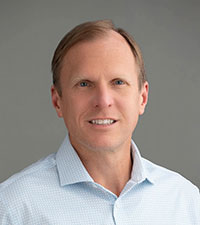Dr. Mark Beamsley, director of medical student education in the Department of Family Medicine and Community Health, has been honored with the prestigious Dean’s Teaching Award from the University of Wisconsin (UW) School of Medicine and Public Health. This award recognizes his outstanding contributions to medical education and his lasting impact on students, colleagues, and the broader academic community.

Mark Beamsley, MD Director, Office of Medical Student Education
Beamsley’s path to medicine began with a childhood fascination with nature and science. “I loved being a medical student,” he recalls. “The classes and content were fascinating, and I always enjoyed thinking and talking about medicine.” Although academic medicine was not part of his original plan, he found himself drawn to teaching during residency at UW. “I sometimes jokingly think of my work in education as being an accidental tourist,” he says. “One opportunity led to another, and eventually to my current role.”
Mentorship That Made a Difference
Among the many influences on his journey, Beamsley credits Dr. David Deci, former director of medical student education, as a pivotal mentor. “David had a wonderful way of connecting with students and colleagues and finding what excites and motivates a person,” he shares. “He encouraged me to take on new responsibilities I might have otherwise shied away from, and that had a big impact on my development.”
Beamsley’s teaching philosophy centers on understanding learners’ goals and building from there. “Earlier on, I approached teaching from a ‘know the basics’ standpoint,” he explains. “But I’ve learned that adult learners are quite good at knowing what they need to learn. There isn’t a one-size-fits-all approach.”
Leading with Innovation and Impact
One of Beamsley’s most lasting contributions has been the development of a longitudinal community health engagement training experience for UW School of Medicine and Public Health students. Collaborating with statewide physicians and curriculum leaders, he helped create a model that blends didactics, reflection, and hands-on community health projects. “It’s still part of every student’s training,” he notes. “It’s helped maintain ongoing partnerships with community organizations and integrate field-based learning into the curriculum.”
He also played a key role in launching a new integrated clinical training course during a major curriculum overhaul. The course combined family medicine with other specialties and involved sites across Wisconsin. “We built the curriculum from the ground up,” he says. “It taught me how to facilitate large-group decision-making and find mutual goals.”
Rising the the Challenge During COVID
The COVID-19 pandemic posed unprecedented challenges to medical education. “Students were removed from clinical environments for months,” he recalls. “We had to rapidly develop online simulated clinical training experiences.” Working with a team of creative and tireless colleagues, he helped ensure continuity in student learning. “We all learned a new degree of flexibility and gained new perspectives and tools for training.”
Receiving the Dean’s Teaching Award is a meaningful milestone for Beamsley. “It’s truly flattering and humbling,” he says. “There are so many outstanding faculty in our department and at UW School of Medicine and Public Health. I’ve learned so much from them over the years and feel fortunate to have had so many opportunities to work with students and residents.”
Published: September 2025
